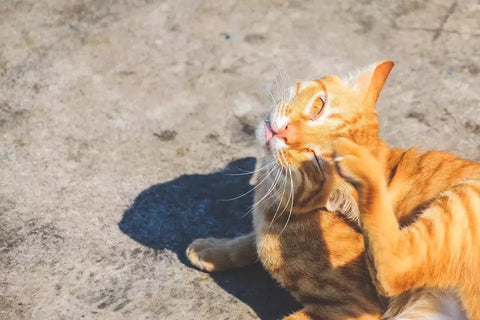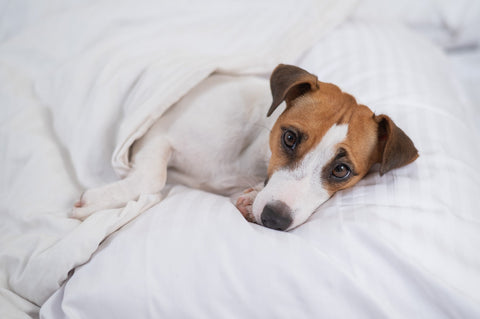The lack of bowel control in dogs is known as fecal incontinence in dogs. This disability is stressful to both you and your dog. But there is actually more to this condition than the messy cleanups!
Is This Fecal Incontinence?
Most of the time, fecal incontinence (bowel incontinence) can be mistaken as diarrhea by most pet parents. Bowel incontinence in dogs while sleeping is often a tell-tale sign that it is fecal incontinence rather than dog diarrhea.
"Fecal incontinence can often be mistaken as diarrhea by pet parents."
To know whether or not your dog is incontinent, here are signs to look for:
- Pooping suddenly when sleeping, lying down, sitting, walking, etc.
- Dragging hind while walking
- Bloating
- Inability to wag tail
- Losing anal area's muscle tone
- Weight loss
- Vomiting
- Diarrhea
- Loss of energy
- Loss of appetite
- Shaking and trembling
- Weakness
- Unusual increase in thirst
- Excessive peeing
To know whether or not your dog is incontinent, here are signs to look for:
- Pooping suddenly (when sleeping, lying down, sitting, walking, etc.) or pooping in areas they shouldn't (around the home or on their dog beds)
- Dragging hind while walking or scooting on the floor (this may be a sign there is an issue involving the anal glands)
- Bloating
- Inability to wag tail or tenderness in areas around the tail
- Losing anal area's muscle tone
Possible Causes of Fecal Incontience
There can be a number of possible reasons why your dog is suffering from fecal incontinence. It can be because of:
- Intestinal worms and parasites
- Damaged or weakened anal reflex muscle
- Infection in the anal sac
- Side effects of medications and/or diet
- Spinal cord diseases, neural disorder, nerve damages that stops the bowel's ability to function properly
- Diseases that disable the rectum's capacity to function
Fecal incontinence is more common in elderly dogs. It is also important to note any gastrointestinal diseases may show similar signs to fecal incontinence.
The best way to know if your dog is struggling with fecal incontinence, is to bring them in to see a veterinarian.
How is Fecal Incontinence in Dogs Diagnosed?

Fecal incontinence can be traced through your dog's health history. Some diseases or injuries can also lead to fecal incontinence.
If you have a feeling your dog has fecal incontinence, and is showing the symptoms mentioned above, it is best that you consult your veterinarian as soon as possible. Your vet can perform necessary tests on your dog, and provide a proper diagnosis and treatment plan.
Treatment and Proper Management of Bowel Incontinence
Treatment and proper management of fecal incontinence can be long-term, and greatly vary depending on the cause.
If incontinence is caused from nutrition or dog food allergies, you may try changing your furbaby's diet. It is also a good idea to feed them on a fixed schedule, as regular bowl movements make incontinence easier for you and your furbaby.
Some dogs who have rectal abnormalities are treated through surgical reconstruction.
Medicated treatments may also be recommended for fecal incontinence. This may include opiate motility-modifying drugs and anti-inflammatory agents prescribed for fecal incontinence. Remember to never self medicate, and always follow your vet's recommendations.
If your dog has fecal incontinence, it is also recommended to maintain a stress-free environment when possible. Avoid loud noises, stray animals, and other stressors. Using Pawtect® Blankets are a great way to provide comfort to your furbaby, while keeping your home clean and dry.
Bowel training is also a great way to manage fecal incontinence. Bowel training is training your dog to poop at certain times of day, particularly after a meal, and helps encourage regular bowel movements. Regular bowel movement can help your dog with fecal incontinence, and allows you to predict when poop is due.
Fecal incontinence in dogs is very stressful and tiring for both you and your dog and it's inevitable to get upset. But while you train or wait for medications to take effect, washable dog diapers will kiss your worries away. These diapers catch the mess before it hits the carpet and are a comfortable choice for your pup. This will prevent you from having to constantly follow your dog's mess all day.
It is also a great idea to use Pawtect® Pads in areas your dog spends time, like crates, bed coverings, and around the house. These washable pads are great for keeping your home clean.
"Bowel training and regular bowel movement can help your dog's fecal incontinence."
When it comes to fecal incontinence, cleanliness can be a huge concern. The best way to get your dog blankets, pee pads, and dog diapers clean is using a dog detergent like PetTergent®. PetTergent® is an enzymatic detergent specifically formulated for pet stains, soils and odors. It will effectively clean any accidents from your pet's laundry, and leave it smelling good.
Fecal incontinence isn’t necessarily fun to deal with but with patience, love and care for your dog, recovery won't be as hard of work as you may think it will be.









